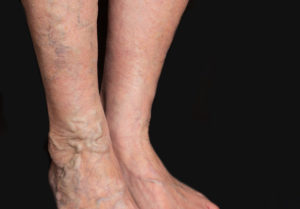Do I have Chronic Venous Insufficiency?
 When the blood valves and the venous wall aren’t working normally, blood will pool in the veins. This can create a condition called chronic venous insufficiency (CVI). Swelling of the ankles and legs, itching legs and feet, skin infections, and varicose veins can result from CVI. Here are the symptoms and risks associated with CVI and what you can do about it.
When the blood valves and the venous wall aren’t working normally, blood will pool in the veins. This can create a condition called chronic venous insufficiency (CVI). Swelling of the ankles and legs, itching legs and feet, skin infections, and varicose veins can result from CVI. Here are the symptoms and risks associated with CVI and what you can do about it.
CVI Risk Factors
If you exhibit one or more of the following factors, you may be at risk of developing chronic venous insufficiency:
- Varicose veins
- Obesity or inactivity
- Extended periods of standing or sitting
- Being female or over the age of 50
- Pregnancy
- Smoking
- Deep vein thrombosis
CVI Symptoms
CVI is associated with: tired and aching legs, swelling in the lower legs, ragged looking leg skin, alterations in skin color, skin ulcers, cramping, itching on the legs and feet, and new varicose veins.
How to treat CVI
If you have any of the symptoms of CVI, schedule an appointment today to meet with our team at Reeder Vein Institute. The earlier we can catch CVI, the more successful the treatment will be. Treatment will depend on your circumstance and the severity of your condition. The following treatments are tried first before more involved methods are recommended: Daily exercise, weight loss for obese patients, taking breaks to avoid long periods of standing or sitting, leg elevation when lying down or sitting, compression stockings, and antibiotics to address skin infections.
If none of these treatments work, sclerotherapy, endovenous thermal radiation or surgery may be used. Sclerotherapy can treat small varicose veins and spider vines by injecting a salt solution directly into the vein. This will cause the blood vessel to swell and stick together, which will close off the vein. Endovenous thermal ablation uses high-frequency radio waves or a laser to convert energy into heat. The heat damages the vein wall,l which in turn closes the vessel off. Both of these treatments force the blood to make a course correction using a healthier adjacent vein.
Schedule an appointment
If you are dealing with any of the symptoms related to CVI, call Reeder Vein Institute today. You can reach us at 682-499-5672 in Dallas, Texas.
Category:
